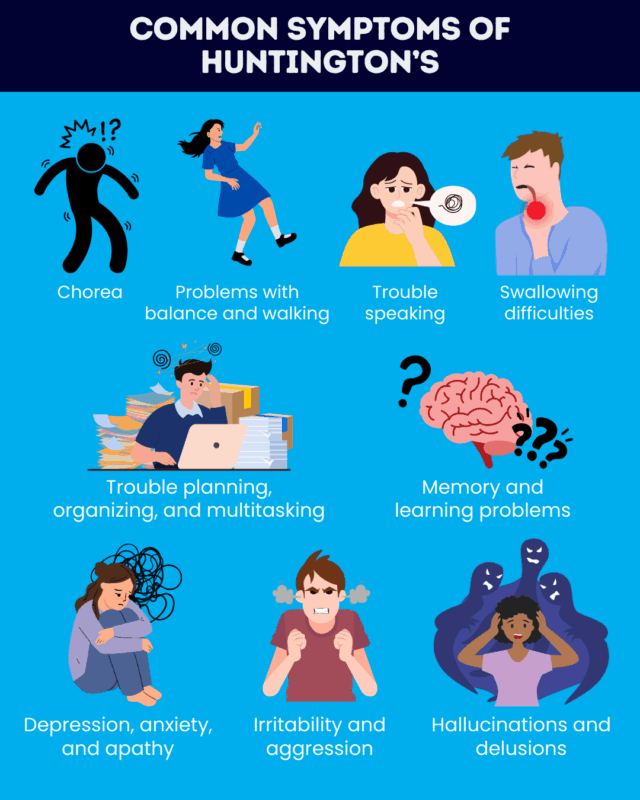 Discussion
Discussion
Huntington’s disease symptoms
Last updated Aug. 14, 2025, by Marisa Wexler, MS

Huntington’s disease is a progressive brain disorder that causes a wide range of neurological symptoms, including movement issues, cognitive difficulties, and behavioral changes.
Although no therapy developed to date can slow or stop disease progression, there are many forms of Huntington’s disease treatment that can help to manage certain symptoms. As such, promptly identifying Huntington’s symptoms is important to facilitate disease diagnosis, optimal management, and planning for the future.
Early signs of Huntington’s disease
The mutation that causes Huntington’s disease is present from the moment a person is conceived, but symptoms typically appear at a mean age of 35 to 44. Symptoms of Huntington’s disease tend to start subtly and then gradually get worse over time.
Early symptoms of Huntington’s disease, which may manifest differently from person to person, typically don’t prevent people from performing daily activities independently. Early signs of Huntington’s disease may include:
- clumsiness or unsteadiness while walking
- mild chorea, or uncontrollable muscle movements, that can affect the arms, legs, or face
- changes in mood, such as irritability, anxiety, depression, or apathy
- difficulty concentrating or thinking through complicated problems
- abnormal eye movements
- a reduced sense of smell
Main symptoms of Huntington’s disease
Signs and symptoms of Huntington’s disease can affect movement, cognitive function, mental health, and behavior.
Symptoms affecting movement
Huntington’s motor symptoms may include:
- chorea
- trouble with balance and walking
- loss of coordination
- smaller movements (hypokinesia)
- unusually slow movements (bradykinesia)
- rigidity
- abnormal movements or postures due to excessive muscle contraction (dystonia)
- problems with eye movements
- speech problems
- difficulty swallowing
Cognitive symptoms
Cognitive symptoms of Huntington’s may include:
- problems in organizing, planning, or making decisions
- difficulties with multitasking and complex problem solving
- memory impairments
- difficulty learning to do things in a new or different way
- slow thinking and reaction times
In the later stages of Huntington’s, patients usually develop dementia, where cognitive problems are severe enough to cause impairments in daily functioning.
Psychiatric and behavioral symptoms
Huntington’s can cause a variety of psychiatric problems and behavior changes, including:
- mood swings
- anxiety
- depression
- apathy
- personality changes
- an inability to recognize one’s own symptoms
- sleep disorders
- irritability
- aggression
- impulsivity
- loss of inhibitions
- psychosis (hallucinations and/or delusions)

Less common symptoms of Huntington’s disease
In addition to the common motor, cognitive, and behavioral manifestations, Huntington’s disease can sometimes cause other symptoms, including:
- weight loss
- sleep disturbances
- sexual dysfunction
- abnormal heart rhythms
- digestive complaints such as constipation
- urinary urgency or incontinence
- pain
Juvenile Huntington’s disease symptoms
Juvenile Huntington’s disease (JHD) is a rare form of the disorder in which symptoms manifest before age 20.
The symptoms of JHD are, to some extent, similar to those of adult-onset Huntington’s, as they include movement problems, issues with cognitive function, and behavioral changes. However, JHD shows some notable differences relative to adult-onset Huntington’s, such as:
- higher rates of rigidity
- lower rates of chorea
- seizures
- difficulty learning or regulating behavior in school
- faster disease progression
Seizures, which affect as many as half of children with JHD, generally do not occur in adult-onset Huntington’s. Difficulty learning or regulating behavior in school is a frequent first sign of the disease.
How symptoms progress over time
Huntington’s is a progressive disorder, and there are several stages of the disease, defined based on the severity of symptoms and how they impact a person’s ability to perform daily activities and live independently.
In the early stages of Huntington’s, occurring typically around the third or fourth decade of life, patients are generally able to do most activities of daily living without assistance. Huntington’s disease early warning signs may include:
- unexplained changes in mood or cognitive function
- unusual clumsiness or mild movement disorders
The time to progress from early- to middle-stage Huntington’s can range from a few years to more than a decade. In Huntington’s middle stages, symptoms become more bothersome, and patients will increasingly require help to manage day-to-day activities. Signs of middle-stage Huntington’s commonly include:
- more pronounced chorea
- worse coordination and balance problems
- trouble speaking and/or swallowing
- more serious cognitive problems and more severe behavioral abnormalities.
Worse coordination and balancing problems can result in a higher risk of falls.
Late-stage Huntington’s can develop anywhere from nine to 26 years after disease onset. At this point in the disease’s progression, patients will have substantial disability and will require assistance with many daily tasks. In late-stage Huntington’s, chorea tends to ease, though other motor symptoms like slowed movement or abnormal postures tend to worsen.
Among other signs and symptoms:
- patients may be unable to walk or speak
- swallowing is often difficult and there is a risk of choking
- cognitive impairments get worse
- psychiatric and behavioral issues are more frequent
Huntington’s Disease News is strictly a news and information website about the disease. It does not provide medical advice, diagnosis or treatment. This content is not intended to be a substitute for professional medical advice, diagnosis, or treatment. Always seek the advice of your physician or other qualified health provider with any questions you may have regarding a medical condition. Never disregard professional medical advice or delay in seeking it because of something you have read on this website.
Recent Posts
- The challenges of navigating dating while living with Huntington’s disease
- Guest Voice: I hate Huntington’s disease, but I love my husband
- New Zealand OKs Phase 1 trial of Huntington’s therapy SRP-1005
- Nothing compares to a punny Valentine’s Day play
- It’s OK to reach out for help during the February slump
- Huntington’s treatment safely slows disease over 9 months in early trial
- A new puppy gives my gene-positive wife a sense of purpose
- Toward a better understanding of anger as a symptom of Huntington’s disease
- Actor Will Forte shares family story in Teva awareness campaign
- Finding ‘space in the middle’ to deal with life’s challenges
Related articles
-
 Discussion
Discussion
-
-



